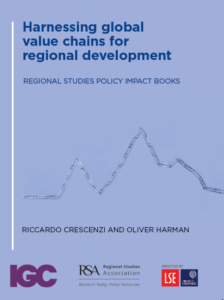 Welcome to our Harnessing Global Value Chains for Regional Development Book page, a portal to the subject. For those interested in the paperback version, e-book version or online version of the book, please follow the links. For those who want to understand a bit more about our work, we provide below numerous resources and forms to engage with the subject matter. You can find material under headings Sharing (associated materials and dissemination), Shaping (policy reports and policymakers engaging with its findings) and Discussing (book reviews and commentary).
Welcome to our Harnessing Global Value Chains for Regional Development Book page, a portal to the subject. For those interested in the paperback version, e-book version or online version of the book, please follow the links. For those who want to understand a bit more about our work, we provide below numerous resources and forms to engage with the subject matter. You can find material under headings Sharing (associated materials and dissemination), Shaping (policy reports and policymakers engaging with its findings) and Discussing (book reviews and commentary).
We recommend starting with our Blurb below and if you like that, perhaps watch ‘What are Global Value Chains and why they matter for economic & regional development: Explainer’ under Sharing.
Blurb
This Regional Studies Policy Impact Book brings together the latest academic evidence and public policy insights on global value chains (GVCs) and foreign direct investment (FDI). It comprises a comprehensive description and explanation of why they matter for regional development and policy. It focuses on how sub-national regions can leverage them for innovation and upgrading, or ‘levelling up’. Specifically, its attention is on how regions can build, embed and reshape GVCs to their local enhancement.
The book makes the case for proactive sub-national public policies for the engagement with GVCs and FDI. Its chosen approach is three-fold. First, it looks at why. Why GVCs and FDI matter and why sub-national policymakers should focus their attention on upgrading. It critically reviews different streams of research and evidence. This is in order to identify key definitions and conceptual foundations for the analysis of the link between GVCs, FDI and innovation at the sub-national and local level. Second, it looks at what. This is through new conceptualisations and critical insights on the regional drivers and impacts of global connectivity, bridging macro-international and micro-firm level approaches. Third, is the critical how. How policymakers can leverage GVCs and FDI for their regional benefit. It aims to review empirical evidence and available policy evaluation in order to highlight what works (and what does not) when leveraging these concepts to shape public policies for regional development.
Sharing
Associated materials and dissemination of the book
- What are Global Value Chains and why they matter for economic & regional development: Explainer
- Global Value Chains for Regional Development: Book Launch
- Climbing up global value chains: leveraging FDI for economic development in Asia
- Global Value Chains for Regional Development in Latin America
- Global Value Chains and dynamic specialization: Upgrading through FDI
- Green Global Value Chains for Sustainable Regional Development
- Global Value Chains and Regional Innovation
- From local regions in the EU to those in Ukraine (and back again): How FDI and global value chains tie our local economies together
- Public policy considerations for climbing global value chains in Asia
- Multiple pathways to upgrading in global value chains in Asia
- Green Global Value Chains for Sustainable Regional Development
- Leveraging opportunities from Global Value Chains for regional development
- Governance Uncovered: Local Politics and Development Podcast of book and application as part of Governance and Local Development Institute University of Gothenburg’s podcast.
- Discussion guide for educators interested in exploring GVCs with students in the Asian context
- Sustainable and ‘green’ global value chain application of the work at Climate Change Summit Central Eastern Europe
- Application to Ukraine in Ukraine Reconstruction Forum 26th and 27th May 2022 at LSE London
- Untangled workshop: old and new inequalities in disruptive times on 1 Feb 2023 in Politecnico di Milano
- Inter American Development Bank Internal Seminars (on-line) 2 November 2022 hosted at Washington DC
- Sustainable Regional Development in the Western Balkans Academy of Science of Albania 31st March 2023 in Tirana, Albania
- La Inversion Extranjera Direct y a multinacionales en un mundo cambiante Foro Canada Blanch Caixa Forum Valencia 20th April 2023
- Centre for Entrepreneurship, SMEs, Regions and Cities; OECD Paris 25th May 2023
Shaping
Policy reports citing the book and policymakers directly engaged with the book’s findings.
- Book’s framework fed into White Paper for Hinrich Foundation: ‘Climbing up global value chains: Leveraging FDI for economic development’.
- Book’s framework fed into report for Asian Infrastructure Investment Bank 2021 Flagship report ‘Sustaining Global Value Chains’.
- Book’s framework fed into UK Parliament Committee on Inward FDI: Written Evidence
- Book’s framework fed into International Trade Committee’s Inward FDI Recommendations to Government
- Working draft of the book referenced in World Bank ‘book’ and policy communication document ‘An Investment Perspective on Global Value Chains’.
- Working draft of the book referenced in World Bank ‘book’ and policy communication document ‘Using Investment Policies to Stimulate Global Value Chain Participation’
- Working draft of the book referenced in OECD Regional Development Working Paper ‘Does FDI benefit incumbent SMEs?’
- Book referenced in OECD Regional Development Paper ‘Networks and rural-urban linkages for rural innovation’
- Book referenced in OECD Business and Finance Policy paper ‘Subnational investment promotion and decentralisation in the OECD’
- Working draft of the book referenced in OECD publication: ‘Measuring the attractiveness of regions’
- Working draft of the book referenced in OECD publication: ‘Rethinking Regional Attractiveness in the New Global Environment’
- Working draft of the book referenced in World Intellectual Property Organization publication: ‘The Geography of Innovation: Local Hotspots Global Networks’
- Working draft of the book referenced in World Intellectual Property Organization publication: ‘The Geography of Innovation: Local Hotspots and Global Innovation Networks’
- Working draft of the book referenced in Publications Office of European Union: ‘The human-centered city’
- Working draft of the book referenced in Publications Office of European Union: ‘Foreign direct investment global value chains and regional economic development in Europe final report’
- Working draft of the book referenced in Publications Office of European Union: ‘Where Global Value Chains go local’
- Applied toolkit of book for Connected Places Catapult—The UK’s innovation accelerator for cities, transport & place leadership’ for North of England local governments: ‘Leveraging opportunities from Global Value Chains for regional development’ (Available upon request)
- Book’s framework fed into Report of the High-Level Group on the Future of Cohesion Policy ‘Forging a Sustainable Future Together: Cohesion For the Competitive and Inclusive Europe’
- Book utilised in section on Building Zambia’s role in the global value chain (GVC) in ‘Positioning Zambia for a copper-plus future’
- Book presented to Bangladesh Investment Development Authority during related policy engagement and research discussion visit in Dhaka.
- Book presented to Indonesia Investment Promotion Centre during related policy engagement and research discussion visit to LSE.
- Book presented to Madrid Investment Promotion Centre during specific policy related engagement visit to LSE.
- Book presented to Director Economy Ministry of Economy and Finance in charge of Industry and Planning, Djibouti during presentation online.
- Book presented to Director of External Trade, Ministry of Trade, Industry, and Local Consumption, Togo during presentation online.
- Book presented to Ministry of Finance, Senegal during presentation online.
- Book presented to Ministry of the Economy and Finance, Direction Générale de L’Economie, Cote D’Ivoire during presentation online.
- Book presented to Senior Minister and Special Adviser to the Prime Minister of Ethiopia during presentation online.
- Book presented to European Commissioner for Cohesion and Reforms during related policy engagement visit in Brussels and LSE.
- Book presented to Department for Regional and Urban Policy (DG REGIO) European Commission during research discussion visit to LSE.
Discussing
Book reviews and critical commentary on the book
- Financial Times FDI intelligence magazine review by Jacopo Dettoni
- LSE Review of Books 2023 review as a recommended read for understanding the economy today
- Economic Geography 2023 review by Sören Scholvin
- Regional Studies 2024 review by Ricardo Hausmann
- European Planning Studies 2024 review by Erwin Syahputra Rambe, Anisa Sulistiani, and Cikal Rambasae N



